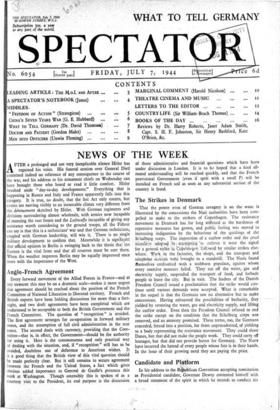Anglo-French Agreement
Every forward movement of the Allied Forces in France—and at any moment this may be on a dramatic scale—makes it more urgent that agreement should be reached about the position of the French Committee of National Liberation in liberated territory. French and British experts have been holding discussions for more than a fort- night, and two draft agreements have been completed which are understood to be acceptable to both the British Government and the French Committee. The question of " recognition " is avoided. The first agreement 'arranges for co-operation in forward military zones, and the assumption of full civil administration in the rear zones. The second deals with currency, providing that the Com- mittee—that is, in effect, the Government—should be the authority for using it. Here is the commonsense and only practical way of dealing with the situation, and, if "recognition" still has to be avoided, doubtless out of deference to American wishes. It is a good thing that the British view of this vital question should be made perfectly clear. But it still remains to secure agreement between the French and the United States, a fact which gives obvious added importance to General de Gaulle's presence this week at Washington. Though ostensibly this is spoken of as a courtesy visit to the President, its real purpose is the discussion
of those administrative and financial questions which have been under discussion in London. It is to loz. hoped that a final all- round understanding will be reached quickly, and that the French provisional Government (even if spelt with a small P) will be installed on French soil as soon as any substantial section of the country is freed.


























